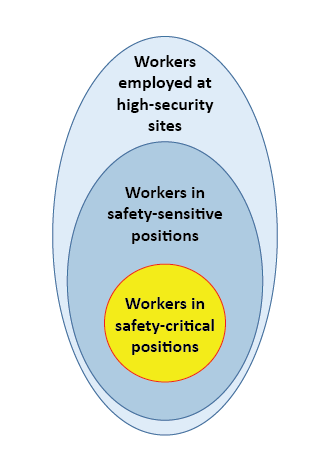Fitness for duty
Human performance plays a key role in the safety of nuclear facilities. Fitness for duty is a condition in which workers are physically, physiologically and psychologically capable of competently and safely performing their tasks.
Why take proactive measures to regulate fitness for duty?
Fitness for duty is one factor that affects human performance. An important element of being fit for duty is being free from the influence of alcohol, legal or illicit drugs or performance-altering medication while at work. A proactive approach to enhancing existing fitness-for-duty programs in the context of Canadian nuclear safety addresses potential risks before they become an issue.
Regulatory requirements
The requirements to address fitness for duty are captured in regulations such as the Class I Nuclear Facilities Regulations and Nuclear Security Regulations. Information clarifying and specifying regulatory expectations are found in the following published CNSC regulatory documents:
REGDOC-2.2.4, Fitness for Duty: Managing Worker Fatigue
- Published in March 2017, it sets out requirements and guidance of the CNSC with respect to managing worker fatigue for workers at high security sites, as defined in the Nuclear Security Regulations. For the purpose of this regulatory document, nuclear safety encompasses security.
REGDOC-2.2.4, Fitness for Duty, Volume II: Managing Alcohol and Drug Use
- Published in December 2017, it sets out requirements and guidance for managing fitness for duty of workers in relation to alcohol and drug use and abuse at all high-security sites, as defined in the Nuclear Security Regulations. More detail on the updates follows, below.
- Published in September 2018, it addresses key considerations for licensees of nuclear power plants and nuclear facilities, when they provide nuclear security officer (NSO) authorization under the Nuclear Security Regulations. It sets out CNSC expectations concerning minimum requirements for NSO medical, physical and psychological certificates.
Update to REGDOC-2.2.4, Volume II
Pre-placement and random testing of workers in safety-critical positions at high-security nuclear sites is on hold, pending the outcome of the judicial review of REGDOC-2.2.4, Fitness for Duty, Volume II: Managing Alcohol and Drug Use, Version 3 by the Federal Court.
The review targets sections 5.1 and 5.5 of this regulatory document.
With the publication of REGDOC-2.2.4, Fitness for Duty, Volume II: Managing Alcohol and Drug Use, the CNSC became the first federal regulator in Canada to have regulatory requirements concerning pre-placement and random testing of alcohol and drug use for safety-critical positions in the workplace.
- Pre-placement testing is required before a worker is hired for a safety-critical position or transferred to one.
- For the number of workers already holding safety-critical positions, the random testing sampling rate is set at 25% per year.
When developing regulatory documents, the CNSC gives careful consideration to which assessments would be imposed on each work group. The objective of REGDOC-2.2.4, Volume II, is to protect the safety and security of nuclear workers, the public and the environment.
The requirements and guidance in this regulatory document pertain to high-security sites, such as nuclear power plants. Specifically, they apply to workers holding safety-sensitive and safety-critical positions.
The CNSC also emphasizes the importance of ensuring that there is a focus on having employee support programs. These non-punitive measures to support workers play an important role in ensuring that the fitness-for-duty program is effective.
Safety-sensitive workers include:
- CNSC-certified health physicists
- Nuclear security personnel, including nuclear security officers and designated non-nuclear response force personnel
- Emergency response teams and fire brigades
Safety-critical workers include:
- CNSC-certified nuclear power plant control room workers
- Onsite nuclear response force members

Workers holding safety-sensitive and safety-critical positions will be required to submit to alcohol and drug testing:
- if there are reasonable grounds
- following an incident in the workplace
- after confirmation of a substance use disorder
Workers holding safety-critical positions will also be required to submit to random and pre-placement alcohol and drug testing.
In 2020, we introduced oral fluid and point of collection testing as accepted methodologies, in addition to previously accepted urine-based laboratory testing.
The restriction of random testing to the most safety significant positions at Canada’s high-security nuclear facilities strikes the right balance between respecting human rights and privacy, and strengthening nuclear safety and security.
Resources
Locations of Canada’s high-security sites
- Whiteshell site (Manitoba)
- Chalk River site (Ontario)
- Bruce site (Ontario)
- Pickering site (Ontario)
- Darlington site (Ontario)
- Gentilly-2 site (Quebec)
- Point Lepreau site (New Brunswick)
Related links
Page details
- Date modified: